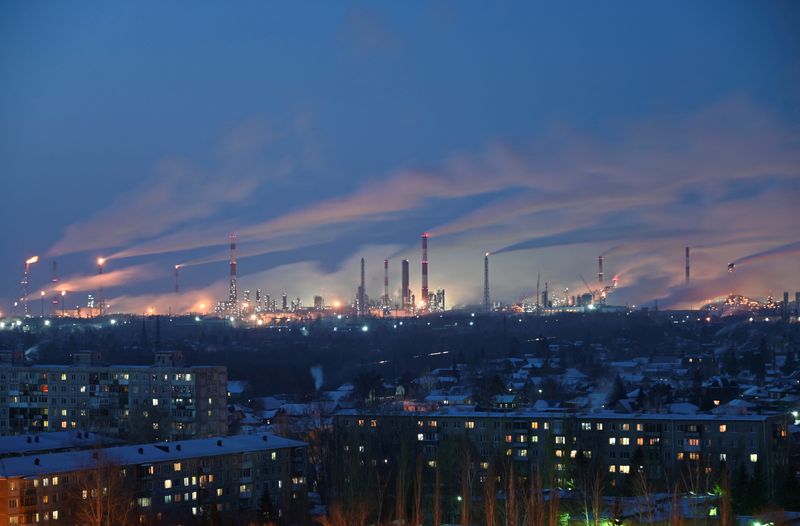By Scott DiSavino
NEW YORK -Crude prices slid 2% on Thursday after the European Union (EU) could not agree on a plan to boycott Russian oil and on reports that exports from Kazakhstan's Caspian Pipeline Consortium (CPC) terminal could partially resume.
European Union leaders are set to agree at a two-day summit starting on Thursday to jointly buy natural gas as they seek to cut reliance on Russian fuels, with some saying they would not comply with Moscow's demand to buy oil and gas using roubles.
But EU countries remain divided on whether to sanction Russian oil and gas directly, a move already taken by the United States.
Brent futures fell $2.57, or 2.1%, to settle at $119.03 a barrel, while U.S. West Texas Intermediate (WTI) crude fell $2.59, or 2.3%, to settle at $112.34.
On Wednesday, both benchmarks closed at their highest since March 8.
Russia's invasion of Ukraine on Feb. 24 has prompted the EU to pledge to slash reliance on Russian fossil fuels by hiking imports from other countries and quickly expanding renewable energy.
The North Atlantic Treaty Organization (NATO) offered Kyiv new military assistance and assigned more troops to its eastern flank as London and Washington imposed fresh sanctions on Moscow.
But without an EU embargo of Russian oil, Commerzbank (DE:CBKG) analyst Carsten Fritsch said sanctions were unlikely to have a major impact on the oil market.
As the EU remains split on imposing outright bans on Russian oil, analysts at Rystad Energy said India and China could import more Russian barrels to boost their refined products output.
The United States and its allies, meanwhile, were discussing a possible further coordinated release of oil from storage to help calm oil markets.
Also weighing on crude prices, the dollar strengthened for the fourth time in five sessions. A stronger dollar makes oil more expensive for holders of other currencies.
Oil prices fell further after ICE (NYSE:ICE) increased margins for May Brent crude futures by 19% effective March 25, the third margin update this year.
Trading was volatile for both crude benchmarks, which rose to fresh two-week highs early in the session on lingering supply concerns including early reports that crude export loadings were suspended at Kazakhstan's CPC terminal following storm damage.
But four sources familiar with the matter said oil exports via the CPC pipeline will partially resume on Thursday.
"Reports that the CPC pipeline would return was a big relief to the market," said John Kilduff, partner at Again Capital in New York, noting supply disruptions from pipeline shutdowns or Russian sanctions are "a big problem because we can't make up those barrels."
Crude prices drew some support from the drop in U.S. crude in the Strategic Petroleum Reserve (SPR) to the lowest level since May 2002.

U.S. crude at the Cushing storage hub in Oklahoma fell in the week to March 22, traders said, referring to a report from data provider Genscape. U.S. government data has shown stockpiles there rising for the past two weeks.
Canada said it has capacity to increase oil and natural gas exports by up to 300,000 barrels per day (bpd) in 2022 to help improve global energy security.